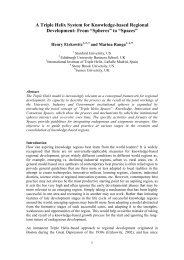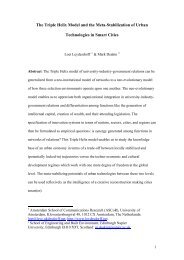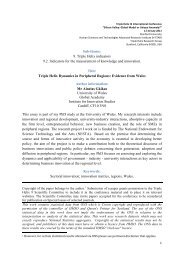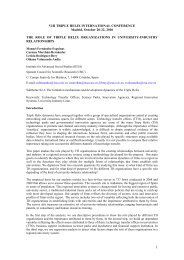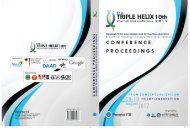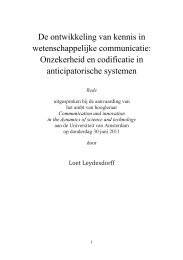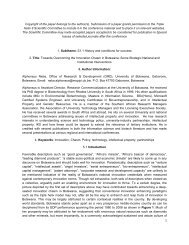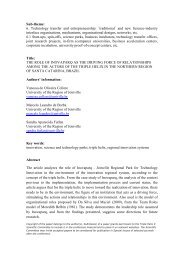TRIPLE HELIX noms.pmd
TRIPLE HELIX noms.pmd
TRIPLE HELIX noms.pmd
You also want an ePaper? Increase the reach of your titles
YUMPU automatically turns print PDFs into web optimized ePapers that Google loves.
O-034Insights into academic understanding of the university’s third role in adeveloping system: empirical evidence from ThailandSuteera Chanthes, Mahasarakham Business School, Mahasarakham University, Mahasarakham, THAILANDJohn Taylor, University of Liverpool, Liverpool, United KingdomIntroductionThere is growing interest in the development of regional innovation systems (RISs) and the involvement of higher educationinstitutions. In Thailand, RISs are being widely promoted; it is assumed that the knowledge economy will be built not only at thenational but also at sub-national levels. This idea is emphasised during the effective period of recent National Economic andSocial Development Plans, particularly that of the Ninth (2002 – 2006) and the Tenth (2007 – 2011) plans (NESDB, 2005,Termpitayapaisit, 2009). This is reinforced by Webster (2006, p.1) who states that ‘[t]he geographic dimension of developmentwill become even more important during the Tenth National Development plan . . . [the objectives of development are] all placebasedconcepts’.Given the national mission, public universities are expected to play their roles in the RIS within their regions. Implicit in thispolicy, academic staff are expected to help fulfil the third role of their universities, alongside the mainstream activities ofresearch and teaching. Notwithstanding this recognition of academic involvement, there is very little literature regarding thedelivery of academic services at operational levels and concerning the way in which these academics make sense of and fulfilthe university’s third role; expectations of their involvement are often made from the national and institutional viewpoints but veryrarely have previous studies looked at the involvement from the perspective of academic staff themselves, especially in thecontext of a developing country. This paper therefore takes a distinctive approach by delivering insights into the perceptions andpractices of academic staff regarding their roles in the RIS. In this sense, the physical connection between the university and itsregion lays a foundation for this inquiry made into academic roles in making a contribution to the economic and social developmentof the region.Research MethodologyThe presentation of this paper is based on grounded theory research involving three investigatory propositions, namely regional,institutional and individual profiling of individual academic members of staff.The setting of this investigation is a multi-site case study carried out in three traditional public universities in Thailand. Accordingto the OEC (2004), this type of university is expected to play a leadership role within their regions, producing and deliveringsuitable knowledge that meets the social and economic needs of the country. Additionally, in order that these universities canadopt an entrepreneurial approach to enhance their organisational management and academic performance, they are currentlyencouraged by the government to become autonomous institutions (ONEC, 2002; OEC, 2004).Given the empirical setting above, research findings presented in this paper are drawn from semi-structured interviews with 24academic staff from various academic and professional backgrounds and positions of leadership and management. A range ofgovernment and institutional documents was also used as a supplementary source of research data.With the grounded theory approach employed, a substantive theory was eventually developed to explain academic involvementwith the RIS, taking into consideration the national policy, the institutional profiling of their universities, the region of which theiruniversities are a member and the individual profiling of the academic staff themselves.Research FindingsAt the institutional level, in response to the national policy, traditional universities have developed their organisational structureand policy on academic management as an attempt to promote the provision of systematic services carried out within theirinstitutions.At the operational level, there are many different forms of academic service delivered at regional level. These services areperformed either in response to regional needs or using resources existing within the regional proximity. Forms of knowledgedelivered through these services could be classified into three categories, including: (1) commercialising knowledge, (2) knowledgeas a public good, and (3) knowledge spillover.Despite services performed, not all of the activities undertaken are systematically accounted as ‘academic service’ performance.Four key issues of relevance to this problem are identified regarding the linkages between institutional and individualperspectives, including: (1) poor internal connections across the university organisational structure; (2) some individualmisconceptions of academic services in the RIS; (3) the lack of shared vision of services at regional level; and (4) the underminedservices of endogenous wisdom specific to the place identified as the university’s surrounding region. These issues reflect thedesignated system of the university being underused.Madrid, October 20, 21 & 22 - 201054



